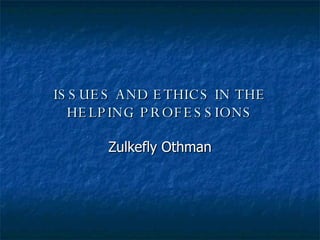Issues And Ethics In The Helping Professions
•Descargar como PPT, PDF•
4 recomendaciones•9,065 vistas
Denunciar
Compartir
Denunciar
Compartir

Más contenido relacionado
La actualidad más candente
La actualidad más candente (20)
Domestic violence presentation (crisis intervention)

Domestic violence presentation (crisis intervention)
Workplace Violence Training by Johns Hopkins University

Workplace Violence Training by Johns Hopkins University
Destacado
Destacado (20)
Intoruction to social work and philosophy of social work by-imran ahmad sajid

Intoruction to social work and philosophy of social work by-imran ahmad sajid
Similar a Issues And Ethics In The Helping Professions
Lecture 4 confidentiality, disclosure and the law.1

Lecture 4 confidentiality, disclosure and the law.1Newham College University Centre Stratford Newham
Similar a Issues And Ethics In The Helping Professions (20)
Lecture 4 confidentiality, disclosure and the law.1

Lecture 4 confidentiality, disclosure and the law.1
INFORMED CONSENTBefore a person becomes a client, he or she must.docx

INFORMED CONSENTBefore a person becomes a client, he or she must.docx
Resources for Week 2 HLTH440 from M.U.S.E. My Unique Student Expe.docx

Resources for Week 2 HLTH440 from M.U.S.E. My Unique Student Expe.docx
Más de inovatifinsan
Más de inovatifinsan (20)
Último
Último (20)
Dwarka Sector 6 Call Girls ( 9873940964 ) Book Hot And Sexy Girls In A Few Cl...

Dwarka Sector 6 Call Girls ( 9873940964 ) Book Hot And Sexy Girls In A Few Cl...
Russian Call Girls Chickpet - 7001305949 Booking and charges genuine rate for...

Russian Call Girls Chickpet - 7001305949 Booking and charges genuine rate for...
Call Girls Thane Just Call 9910780858 Get High Class Call Girls Service

Call Girls Thane Just Call 9910780858 Get High Class Call Girls Service
Call Girls Hebbal Just Call 7001305949 Top Class Call Girl Service Available

Call Girls Hebbal Just Call 7001305949 Top Class Call Girl Service Available
call girls in green park DELHI 🔝 >༒9540349809 🔝 genuine Escort Service 🔝✔️✔️

call girls in green park DELHI 🔝 >༒9540349809 🔝 genuine Escort Service 🔝✔️✔️
Call Girls Electronic City Just Call 7001305949 Top Class Call Girl Service A...

Call Girls Electronic City Just Call 7001305949 Top Class Call Girl Service A...
Call Girls Service Chennai Jiya 7001305949 Independent Escort Service Chennai

Call Girls Service Chennai Jiya 7001305949 Independent Escort Service Chennai
Call Girl Nagpur Sia 7001305949 Independent Escort Service Nagpur

Call Girl Nagpur Sia 7001305949 Independent Escort Service Nagpur
Call Girl Surat Madhuri 7001305949 Independent Escort Service Surat

Call Girl Surat Madhuri 7001305949 Independent Escort Service Surat
Call Girls ITPL Just Call 7001305949 Top Class Call Girl Service Available

Call Girls ITPL Just Call 7001305949 Top Class Call Girl Service Available
Housewife Call Girls Bangalore - Call 7001305949 Rs-3500 with A/C Room Cash o...

Housewife Call Girls Bangalore - Call 7001305949 Rs-3500 with A/C Room Cash o...
Call Girls In Andheri East Call 9920874524 Book Hot And Sexy Girls

Call Girls In Andheri East Call 9920874524 Book Hot And Sexy Girls
Russian Call Girls Gunjur Mugalur Road : 7001305949 High Profile Model Escort...

Russian Call Girls Gunjur Mugalur Road : 7001305949 High Profile Model Escort...
Glomerular Filtration and determinants of glomerular filtration .pptx

Glomerular Filtration and determinants of glomerular filtration .pptx
Call Girls Viman Nagar 7001305949 All Area Service COD available Any Time

Call Girls Viman Nagar 7001305949 All Area Service COD available Any Time
Low Rate Call Girls Mumbai Suman 9910780858 Independent Escort Service Mumbai

Low Rate Call Girls Mumbai Suman 9910780858 Independent Escort Service Mumbai
Book Call Girls in Yelahanka - For 7001305949 Cheap & Best with original Photos

Book Call Girls in Yelahanka - For 7001305949 Cheap & Best with original Photos
Housewife Call Girls Hsr Layout - Call 7001305949 Rs-3500 with A/C Room Cash ...

Housewife Call Girls Hsr Layout - Call 7001305949 Rs-3500 with A/C Room Cash ...
Issues And Ethics In The Helping Professions
- 1. ISSUES AND ETHICS IN THE HELPING PROFESSIONS Zulkefly Othman